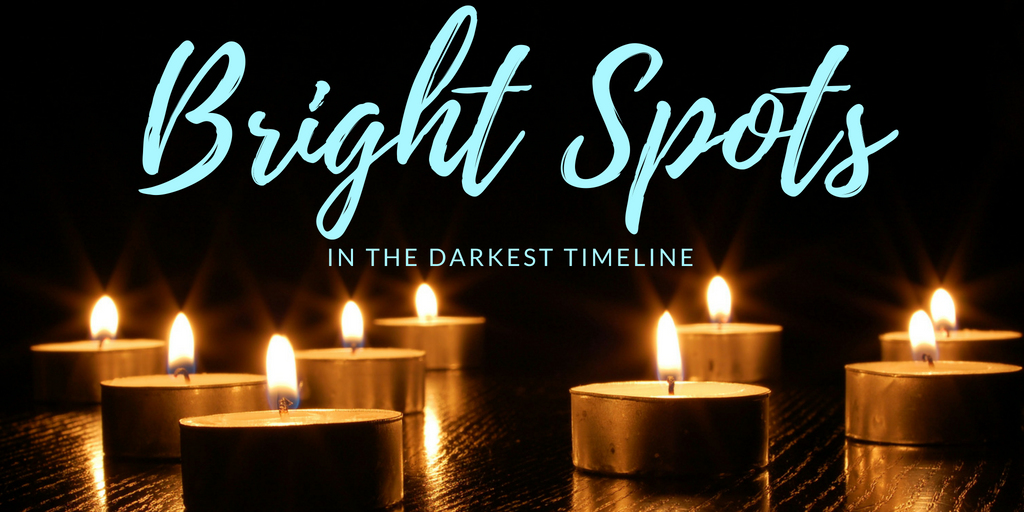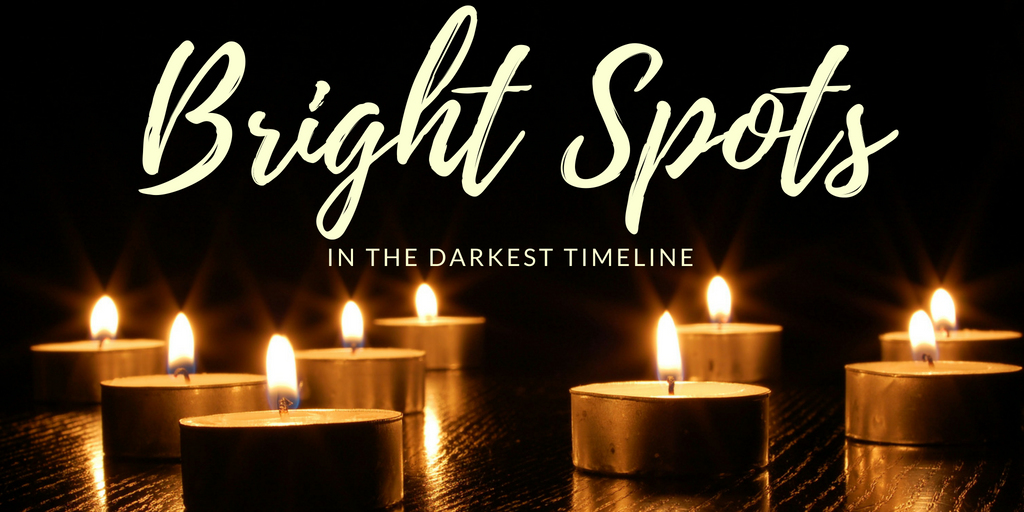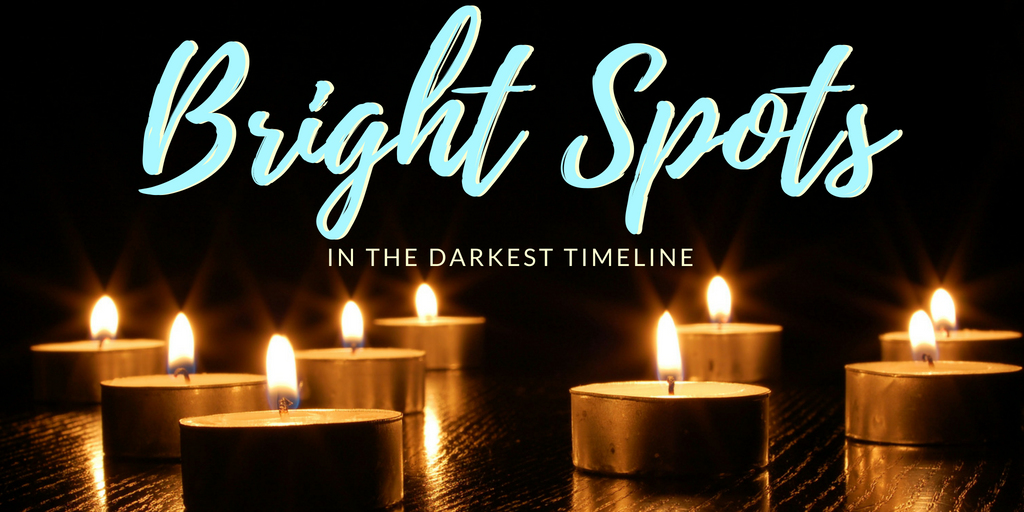When Brian Hades and I were discussing themes for Nevertheless (Tesseracts Twenty-one) one of the possibilities he suggested was optimistic speculative fiction. I pounced on that idea for two reasons. First, because I’d just recently become aware of solarpunk (largely through Sarena Ulibarri) and was excited to work on an anthology that might include some and second because I’d become convinced that we were living in the darkest timeline.
That was in 2016. I had no idea how much darker it could become.
Still, despite a very difficult couple of years, I manage to find reasons for optimism. Lights in the darkness. And I’m not alone in that.
In the coming weeks I will be hosting a series of blog posts I’m calling “Bright Spots in the Darkest Timeline”. Each will be written by a Nevertheless (Tesseracts Twenty-one) contributor and I think they will serve the dual purpose of giving me an excuse to talk about the anthology, and shining a bit of light into people’s lives.
This post from Alison McBain talks about something that’s all too easily forgotten and taking steps in the right direction…
NEVERTHELESS BLOG POST
by Alison McBain
I think the most important lesson I’ve learned in my writing journey is there is no down without an up, too. Writers talk a lot about harsh critiques, bad reviews, and rejections, rejections, rejections—but there’s also the opposite. Those days where you not only get one acceptance, but you get FIVE. Or when you get your story into your dream journal or magazine or anthology. When someone emails you and says, “Hey, I like your writing.” Or the best yet, when you get another writer saying, “You’ve inspired MY writing journey.”
Now, how cool is that? I had that happen to me this year, and when the person said it to my face, I wanted to turn around and look behind me to see who the person must be talking to, because it couldn’t be me. MY words were an inspiration to someone else who wanted to write? That just blew me away.
This year was a great one for me for a number of reasons—I had a lot of “firsts.” While I’ve had a number of short stories and poems published over the past five years, 2018 was when my debut YA novel, The Rose Queen, hit shelves in July. It’s a gender-inverted retelling of Beauty and the Beast and the first of a trilogy, and people seem to be enjoying it so far. In fact, I’ve had several readers ask when the next in the series will come out (answer: 2019).
Also this year, I became lead editor for the first time and helped put together a very awesome time travel anthology containing stories by a number of award-winning authors from around the world. It’s called When to Now and will be available for sale on October 1st. I was also “promoted” at Bewildering Stories, so I’m a coordinating editor and a member of the Review Board, and get to help choose the quarterly and annual awards to celebrate the best writing the magazine publishes each year.
I feel that now is the best time to be a woman, a POC, and a speculative fiction writer. Every day I hear /read about another anthology or another award that is going to an author in one of these aforementioned categories, to say nothing about the growing popularity of speculative fiction writers from many other marginalized communities and groups. For example, in the Fairfield Scribes’ soon-to-be-released anthology that I’m editing, When to Now, ten out of the eighteen stories are penned by women. And for the second year in a row, the Hugo Awards were dominated by women writers. I can’t say how inspiring this is to me.
I’m not blind to a number of ongoing trends around the world, however—and sometimes it’s hard to stay optimistic when I’m writing science fiction stories, since it seems like perhaps there won’t be a world as we would like to imagine it in 1000—or even 500—years. And perhaps, despite focusing on an optimistic outlook, things could change for the worse sooner than that.
I’ve written dystopian. I know how that line of reasoning goes.
On the other hand, I’d like to think that for every step backward, we’re taking two steps forward. Not just me, personally, but in all the realms of technology, society, and culture. We’re a global community of writers, now more than ever, and it’s a great time to celebrate how far we’ve come. And to look forward to where we have yet to go, and how we can get there together.
 Alison McBain was born in Alberta, grew up in California and received her B.A. in African history and classical literature at U.C. Santa Cruz. After her nomadic twenties, she settled in Fairfield, Connecticut, where she is raising three girls and her husband.
Alison McBain was born in Alberta, grew up in California and received her B.A. in African history and classical literature at U.C. Santa Cruz. After her nomadic twenties, she settled in Fairfield, Connecticut, where she is raising three girls and her husband.
She is an award-winning author with more than 70 short stories and poems published, and her YA fantasy novel, The Rose Queen, was released at the end of July. She is also an editor for an awesome time travel anthology coming out October 1st called When to Now. It has contributions from more than ten local authors, in addition to stories penned from around the world, including writers from India, New Zealand, Britain, and Canada.
When not writing, she practices origami meditation and draws all over the walls of her house with the enthusiastic help of her kids. Once in a while, she puts on her editor hat for the magazine Bewildering Stories, or interviews authors and artists at her website www.alisonmcbain.com.



 Kate Heartfield is a former journalist in Ottawa, Canada. Her novel Armed in Her Fashion was published in spring 2018 by ChiZine Publications, and she has a time-travel novella, Alice Payne Arrives, coming in November 2018 from Tor.com Publishing.
Kate Heartfield is a former journalist in Ottawa, Canada. Her novel Armed in Her Fashion was published in spring 2018 by ChiZine Publications, and she has a time-travel novella, Alice Payne Arrives, coming in November 2018 from Tor.com Publishing.


